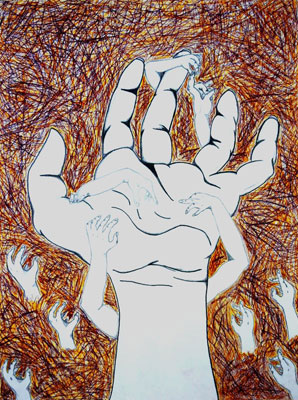All Nonfiction
- Bullying
- Books
- Academic
- Author Interviews
- Celebrity interviews
- College Articles
- College Essays
- Educator of the Year
- Heroes
- Interviews
- Memoir
- Personal Experience
- Sports
- Travel & Culture
All Opinions
- Bullying
- Current Events / Politics
- Discrimination
- Drugs / Alcohol / Smoking
- Entertainment / Celebrities
- Environment
- Love / Relationships
- Movies / Music / TV
- Pop Culture / Trends
- School / College
- Social Issues / Civics
- Spirituality / Religion
- Sports / Hobbies
All Hot Topics
- Bullying
- Community Service
- Environment
- Health
- Letters to the Editor
- Pride & Prejudice
- What Matters
- Back
Summer Guide
- Program Links
- Program Reviews
- Back
College Guide
- College Links
- College Reviews
- College Essays
- College Articles
- Back
Cultural Appropriation: There Is No "Melting Pot"
As the world evolves and culture continues to spread, far too often do people, especially celebrities, cross the fine line between cultural appreciation and cultural appropriation.
Cultural appreciation involves the adoption of another culture’s practices in the same manner that the culture itself practices it; however, cultural appropriation involves the adoption of another culture’s practices in a manner that undermines the practices’ significance and reduces it to something that would be found in modern pop culture. The problem lies not in borrowing aspects of a culture; it lies in the fact that most people who borrow aspects of a culture tend to exploit them.
Cultural appropriation has been a problem for centuries; however, it has become a more prevalent issue in the past few years, as celebrities and other famous figures have been appropriating other cultures. Youth, especially those on social networking sites such as Tumblr and Twitter, have taken to calling out such acts of cultural appropriation. They are typically accurate in what they consider to be cultural appropriation and recognize that our world being a “melting pot” does not entitle Westerners to adopt other cultures as they please, even if minorities choose to adopt a more Western culture.
Most of the problem lies in the fact that the exchange of cultural values between Caucasians and minorities (or otherwise mocked or oppressed cultures) isn’t equal. Many people believe that if a person belonging to a minority steps away from their culture and adorns modern, Western clothing, then they are entitled to step away from their clothing and adorn the minority’s traditional clothing. As Jarune Uwujaren writes, “Just because Indian Americans wear business suits doesn’t mean all Americans own bindis and saris. Just because some black Americans straighten their hair doesn’t mean all Americans own dreadlocks.” She also says that, “The fact is, Western culture invites and, at times, demands assimilation. Not every culture has chosen to open itself up to being adopted by outsiders in the same way.”
Most of the time, it is not a person of color’s choice to adopt a Western culture. They are forced to do so because traditional customs are deemed to be “unprofessional” in our society. Most workplaces would expect that one would show up to work in a “professional” skirt, not in a sari. If all traditional customs and values were given the same amount of respect, cultural appropriation would not be an issue, as there would be no majority to deem what kind of lifestyle is normal or not, and there would be no minorities that would be forced to conform to these standards.
Westerners and people of different ethnicities are perceived differently by our society, even when practicing the same culture and adopting the same customs. As is written in “Cultural Appreciation or Cultural Appropriation?”, “White people wearing keffiyehs [Arab headscarves] are seen as hip, fashion-forward, and worldly, whereas Arab- and Muslim-perceived people wearing keffiyehs are seen as dangerous, Others, and terrorists.” Society’s perception of certain ethnic bodies itself is an example of cultural appropriation: a majority, typically Westerners, undermining a traditional practice, but deeming it okay as soon as they adopt it.
Appropriating someone’s culture isn’t a conscious decision. Nobody wakes up and says, “Oh! Today I’m going to steal a minority’s clothing and customs and reduce things that they value into pop-culture “trash”.” In fact, many people believe that they’re respecting other cultures when they wear a minority’s clothing or perform a certain ritual because cultural appropriation is so deeply embedded in our lives.
As said in “Cultural Appreciation or Cultural Appropriation?”, “Cultural appropriation is not an acceptable way to honor, respect, or appreciate People of Color. If you wish to honor, respect, or appreciate Black people or Black culture, then you should learn how to recognize, confront, and dismantle systematic racism instead of appropriating dreadlocks, a symbol of the wearer’s commitment to Jah Rastafari and Black resistance to racism. If you wish to honor, respect, or appreciate Native people or Native culture, learn how to listen to Native people when they identify very real problems (and how to confront them) faced by Native people today, such as astronomical suicide and alcoholism rates on reservations or the continued theft of Native lands by resource extraction companies.”
When it comes down to it, there are actually very few ways in which one can respect another’s culture without it being appropriation. Until society can accept all cultures and traditions as equal, and do not deem them to be “weird” or “exotic,” borrowing another person’s customs will lead to exploitation regardless of one’s intentions or their wish to respect and honor another person’s practices.

Similar Articles
JOIN THE DISCUSSION
This article has 0 comments.
